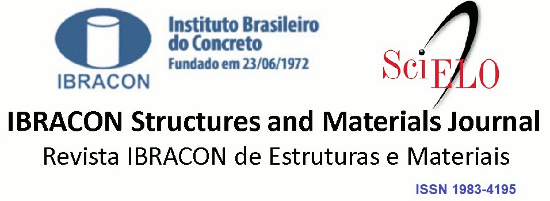Abstract
Sulfate attack is a term used to describe a series of chemical reactions between sulfate ions and hydrated compounds of the hardened cement paste. Thus, the chemical composition of the binders used is important for the durability of the structure against this aggressive agent. The objective of the present research is to evaluate the influence of sodium and magnesium sulfates on physical properties (linear expansion, flexure tensile strength, and compressive strength) of mortars composed by SR cement (CP V - ARI RS), as commercially sold in Brazil. The results indicate that SR cement complies the requirements established by Brazilian standards, as to chemical composition and resistance to sodium sulfate. However, for magnesium sulfate, SR cement was harmful to mortars mainly in mechanical.
Keywords:
durability; sulfate attack; sodium sulfate; magnesium sulfate










